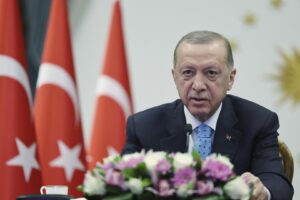Less than a week after former Grand Slam tennis champion Boris Becker was freed after serving seven and a half months in a UK jail, he has spoken of his loneliness, his fears and the lessons he learned behind bars.
In a lengthy and at times emotional one-on-one German TV interview, he revealed he had learned a hard, painful and very expensive lesson and rediscovered the person he once was: “But the whole experience also taught me something important and good. And some things happen for a good reason.”
Becker, 55, was jailed last April for two and a half years for hiding £2.5m (€2.9m; $3m) of his assets and loans to avoid paying his creditors. He was declared bankrupt in 2017 with debts of almost £50m because of an unpaid loan of more than £3m on his Spanish estate in Majorca.
Last week the former tennis champion and BBC TV commentator was deported to Germany, on a private plane paid for by a friend. His interview with TV host Steven Gätjen for German commercial broadcaster Sat 1 went out on Tuesday night.
His first weeks in detention were at Wandsworth Prison in south-west London, but most of sentence was spent at Huntercombe Prison, near Henley in Oxfordshire. As a Category C jail, it is more secure than an open prison and one of two facilities reserved for foreign nationals.
Dressed for the interview in black, Becker immediately cut a slimmer figure than when he was sent to prison in April. His hair was also visibly darker. In prison you’re a nobody, you’re just a number, he said. His was A2923EV.
“For the first time in my life I felt hungry – meaning I went to bed hungry,” he remarked, pointing out he weighed 97kg on arrival in jail and lost 7kg over the next few months, although he had since put on more weight. “Prison was good for my health. They did have alcohol but I didn’t drink any.”
At Wandsworth he was given a cell to himself because of his name, he said. But when the door slammed shut for the first time it was for him the loneliest moment he had ever had. He remembered being unable to sleep because of screams from fellow inmates, who were every kind of criminal imaginable.
There was no mirror in his cell because it could be used as a weapon and he admitted to being shocked when he discovered how he had changed.
Although he was afraid of taking a shower because of attacks he had seen in films, in reality there was enough privacy so “you don’t see anyone naked”. He also spoke of one prisoner at Wandsworth who had tried to blackmail him into giving him money.
Prison life was clearly a challenge and Becker did not hold back in his description of death threats, very dirty cells and highly dangerous inmates. “My main concern was having a double cell. Your cellmate can attack or threaten you.”
For the first three weeks he said he tried not to stick out and just wore grey. He learnt to avoid looking at other inmates and kept his eyes to the ground: “Just don’t look at another inmate the wrong way.”
“Actually I once had what they call an ‘altercation’ with an inmate who wanted to kill me,” he said of an incident at Huntercombe prison in October.
“He tried to come after me, he told me all the things he’d do to me,” said Becker. When he shouted for help it was other prisoners on the wing who had to come out to help. Prison guards tended to turn up slowly, or not at all, he said.
The man had underestimated Becker’s position in prison, he believed, and later asked for his forgiveness and kissed his hand.
He got to know three inmates he names as Jake, Russell and Billy who he describes as “listeners” and even credits them with saving his life.
After three months at Huntercombe, Becker describes being transferred to another wing where he worked as a fitness trainer and taught Maths, English and even Greek philosophy.
He was full of praise for some of his fellow inmates for their support and spoke movingly of the support he had received from two figures from the world of German sport who know the UK well.
Former Wimbledon tennis champion Michael Stich sent him a three-page letter and Liverpool manager Jürgen Klopp had wanted to visit but was not allowed to, partly for his own safety but also because the prison did not want the fuss.
Becker’s partner Lilian de Carvalho Monteiro visited every two weeks, and his two older sons, Noah and Elias also came, although he decided it was better for his younger two children not to come.
While he enjoyed the two hours together, he always wanted to go home afterwards or to an Italian restaurant, but instead went back to his cell and the reality of prison life returned.
He was often emotional during the interview, which lasted more than two hours and for which he was paid a purported €500,000.
His 231 days in prison had, he said, given him time to rethink his life and to become closer to his four children and partner. His relationship with his daughter had become closer than ever, he said.
“When the cell door closes, then there is nothing left,” he said. His task now was not to waste his second chance.
Source : BBC News
















